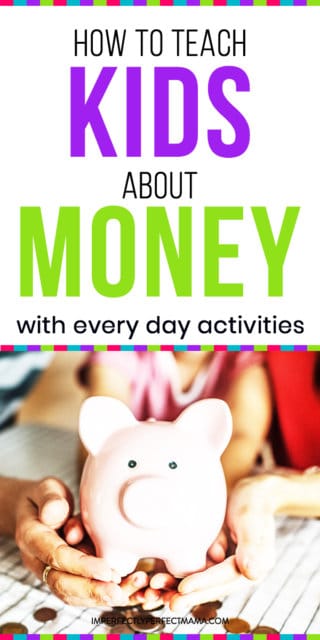Do you feel uncomfortable and awkward about teaching your kids about money?

Do you find it hard to broach money topics to them in your daily life?
You’re not alone. My parents hardly ever talked about money in my presence. Because of this, I didn’t know how to manage my money wisely.
The result?
I had a net worth of only several hundred dollars in my early 20s.
It’s not surprising that I had never developed the habit of saving (until I met my significant half).
How many times were you on the brink of talking about money with your kids, but shrank back at the last minute? Always waiting for the perfect time?
The truth is, there will never be a perfect time. The best time is now.
When you tell yourself that you’re not prescribing, but explaining and guiding your kids, money discussions become so much easier.
So don’t leave the financial topics till it’s too late. It may feel strange at first, but you WILL get better with practice.
By the end of this post, you’ll be able to create or seize everyday opportunities to teach your kids about money.
OK, when to talk about money matters?
1. Meal Times

With our hectic lifestyles, our families may not get many opportunities to have meals together.
So when you catch that precious window of a meal time, make sure that everyone is told beforehand to put away their phones. An informal atmosphere where everyone is relaxed and happy would be a great way to discuss about money, especially if all of you are happily munching on pizzas and burgers.
The most important thing is to be casual and relaxed when discussing money with your kids.
You can show them what you bought recently and how you compared product prices and features before deciding on the best buys.
Show them the adverts on the alternative brands that you considered but did not buy. Doing this makes money and spending more concrete topics to discuss.
Ask your kids whether they think you made a good choice, and why.
Listen to their views and respect their ideas. Encourage them to explain and justify their opinions.
2. Car Trips
Most mamas like you will be ferrying your school-going kids during most of the year to school-related activities and sports events.
Being together in the car gives you golden opportunities to converse casually about money. Even simple things like asking what your kids bought for lunch and how much it cost are great money topics.
For example, I discussed which bakeries offer the best value with my son. He loves pies. Even though the café on campus sells pies at $4, he prefers to walk much further to another bakery to buy $4.20 pies.
Why?
He’s learned from me about how to choose great value buys. The $4.20 pies are loaded with huge chunks of juicy meat with thin crusts, whereas the ones on campus have a thick crust and watery filling with a few scraps of meat!
3. Shopping

Shopping time is perfect for discussions about money. This includes any kind of shopping – grocery shopping, online shopping or window shopping.
While you’re shopping together with your kids, you can talk about:
- The importance of making shopping lists to avoid making impulsive purchases
- The dangers of impulse buying
- How you make your shopping budget go further (Make a shopping budget now if you don’t have one!)
- Not buying unnecessary stuff just because there are sales (There are always sales going on! Retailers are just after more of your hard-earned money!)
- Avoiding paying more for brand names when their quality isn’t better than lesser brands
What are the benefits of talking about the whys and whats during shopping?
You can focus on developing in your kids good habits like sticking to a grocery list, looking out for Necessary items that are on genuine sale, and how to recognize real bargains.
You’ll also be teaching them how Maths can be applied in the real world – they’ll very soon understand why being good at Maths is useful and important to help them save more money.
4. Household Activities
Did you know you can talk about money during just about any kind of household activities that involves you and your kids?
Some examples include:
- Weeding the garden
- Walking the dog
- Tidying up the garage / attic / basement
- Washing the car
- Taking walks in parks or along the beach
- Family car trips
As you can see, there’re plenty of opportunities which you can choose to talk about money.
These discussions don’t always require the use of calculators.
Ask for their opinions and listen to what your kids say.
Depending on the age of your child, you can ask relatively simple questions of younger kids. For example, which brand of pet food should mommy buy? The one with the most attractive doggie or kitty on its label?
5. Bill Paying Times

This is another excellent opportunity to teach your kids about money. If you have hard copy bills, consolidate them in a stack. Your kids would be able to see bills in a more concrete way.
If they’re old enough, get them to use the calculator and add the bills up.
Again, you’re using real world scenarios to show them that Maths can be put to good use.
6. Checking Your Receipts
When you receive your monthly credit card statement, get your kids to check off the items in the statement as you go through the receipts one by one, to make sure that you are charged correctly for the transactions.
It’s important for kids to learn this careful practise and develop this good habit 🙂
7. Money Games
What better way to have fun with money than to play money games with your kids?
You can play board games like Monopoly or online money games. The best part? They’re FREE.
Check out this fun, educational site. Its games like the Piggy Bank game incorporate maths and money. They’re suitable for ages from preschool to 5th grade.
This is the perfect opportunity to teach your kids about money.
When you interact with and play money games with them, you’re passing on valuable money skills that will make their financial future better and more secure.
For instance, your kids can learn about identifying the denomination of coins with the Couch Fishing game. They won’t even know they’re learning Maths and using Maths to further their understanding of money.
Wrap Up
As you can see, there’re so many opportunities to chat with your kids about money.
It need not be a ‘let’s sit around the table with calculators and pencils and paper” scenario. Keep it as casual as possible. Whenever a suitable opportunity presents itself, introduce money concepts.
It’s really important to steer them on the correct path to financial success.
Now that you’ve read all these tips, you’ll be better able to talk about money in a relaxed manner with your kids. All the best!




Leave a Reply